Weasel Words: There is no such thing as 'sex work'
A 'client' is a john, a 'manager' is a pimp, and 'sex work' is neither sex nor work. Prostitution, puntering and pimping need to be named to be understood
Prostitution is a human rights violation against women and girls, although not everyone shares this understanding. We are now at a crossroads, with a number of countries around the world under pressure to either remove all laws pertaining to the sex trade (including those governing pimping and brothel owning), or to criminalise the purchase of sex (known as the Abolitionist or Nordic model). However, the polarised debate on the sex trade, being played out within academia, media, feminist circles and human rights organisations has reached a critical point.
Sex buyers have described prostitution as like “renting an organ for 10 minutes”, which the women in prostitution say makes them feel as if they are “toilets”. This language and this experience serves to dehumanises the women, and the effects of this are wide-ranging, including depression, suicidality, post traumatic stress disorder, dissociation, substance abuse, eating disorders and more.
No other human rights violation towards women and girls is so grossly misunderstood. While domestic violence has often been, and sometimes still is, assumed to be the fault of the victim (‘She was nagging him’, ‘She failed to understand his moods’), there has been a significant improvement in the way that those experiencing it are supported and the perpetrators called to task thanks to feminist campaigning and interventions.
Part of dismantling the ‘happy hooker’ myth involves addressing the misuse of language relating to the sex trade.
In recent years, despite the increasing numbers of women with direct experience of being prostituted coming out as ‘survivors’ of the sex trade, the dominant discourse is one of prostitution being about ‘choice’ and ‘agency’ for the women involved. The human rights abuse involved in the sex trade, according to the liberals, libertarians and many of those who profit from selling sex, is when men are deterred from purchasing sex, and not when they rent the orifices of a woman for sexual release. The women selling sex, according to this logic, are the victims of pearl-clutching moralists who wish to take away their right to earn a living. We are labelled ‘anti-sex’. The idea that to object to the sexual abuse of prostituted women means that abolitionists dislike sex is like suggesting that to dislike McDonalds is to be ‘anti-food’. Prostitution is one-sided sexual gratification for the sex buyer.
In 2009, I began a study on women exiting prostitution. During my time interviewing the women as well as health-funded service providers, I realised just how persuasive the misinformation and misuse of language surrounding the sex trade is. It was not unusual for the staff and volunteers of such organisations to ask the women about their ‘boyfriends’ (pimps); speak to the women about ‘sex work’, a term the women did not themselves use; and ‘safe sex and harm reduction’ when the women were well aware that prostitution is dangerous and cannot be made safe by condoms and rape alarms.
Prostitution survivors, such as the author and founder of the abolitionist NGO SPACE International Rachel Moran, says that the concept of ‘choice’ when applied to prostitution is both misleading and offensive because, “The cash IS the coercion, and no woman or girl would choose prostitution if she had other options. It is a ‘choice’ out of no choice.”
“What about disabled men?” is a question that abolitionists and those critical of prostitution are asked on a regular basis. The argument holds that disabled people have a right to access sex, with the implied premise that their disability somehow impairs their ability to form intimate relationships. This claim is one of the clearest examples of how the sex buyers’ so-called ‘human rights’ have been placed above those of the prostituted woman.
Wadia, Gujarat (2015), a village built on prostitution. The boys are raised to be pimps, and the girls, to be prostituted
To hear the way many apologists for the sex trade describe disabled sex buyers, one could easily get the impression that selling sex to disabled men is an altruistic service, akin to meals on wheels. But the focus on this largely mythical buyer obscures both the majority of ‘undeserving’ punters and the harms done to women.
‘Maybe if men could get it [prostitution] on the NHS [National Health Service] if they are disabled, it would prevent them from raping,’ one sex buyer told me in an interview.
This is another myth used to support prostitution: that if men cannot access sex they will be compelled to rape. Obviously, no man is programmed to commit acts of sexual assault, and a lack of sexual access to women is NEVER an excuse to pay for sex.
Another extremely pervasive myth is that abolishing prostitution removed the ‘agency’ and ‘freedom’ from women who ‘choose’ to be ‘sex workers’.
Abolitionists are regularly accused of being anti-sex moralists, prudes and man-haters.
The debate on the sex trade has reached a new nadir. Globally, groups are being funded to lobby for decriminalisation of all forms of prostitution. Most, if not all, of the major funders describe themselves as human rights-based organisations. So-called ‘sex workers’ rights activists’ are marching in the streets, waving their red umbrellas (a symbol of the ‘sex workers’ rights’ movement) and shouting about the rights of women and men to do what they wish with their bodies.
‘When I was in prostitution I would always say, “I’m fine, I love what I do”. I had to or I would have gone mad’, says Alice. ‘It is only when we get out, if we are lucky enough to get out alive, we can admit the hell, the horror of what was happening to us.’
One of the consequences of the ongoing ‘sanitisation’ of the sex trade is that language loses all meaning. For example, pimps become ‘managers’, prostituted women become ‘sex workers’ and rape is an ‘occupational hazard’.
The term ‘forced sex work’ has become widely used among some international non-governmental organisations (including, for example, Action Aid), which strikes me as an oxymoron. If we are to take the intended meaning of ‘sex work’ (to engage in sex as labour), surely if the ‘sex’ part of sex work is forced, it is actually rape or slavery?
The most effective way to sanitise any human rights abuse is to rename it. For example a pro-slavery strategist in the West Indies suggested: ‘Instead of SLAVES, let the Negroes be called ASSISTANT PLANTERS and we shall not then hear such violent outcries against the slave trade by pious divines, tender- hearted poetesses and short-sighted politicians’.
In the past few decades, prostitution and the sex trade have been given a serious makeover. The title of my 2017 book, The Pimping of Prostitution, is meant to convey how sanitised commercial sexual exploitation has become. For example, The Urban Dictionary definition of pimping is ‘to make something “cool”, “better” or “awesome.”’
In recent years, the sex trade has been rebranded to give the impression that it is not harmful, nor even prostitution. Academics and pro-prostitution activists have begun to use terms such as ‘selling love’, ‘transactional sex’ and ‘compensated daters’ as euphemisms for prostitution. Those who support the sex trade use terminology that masks the reality of what it actually is: one person, almost always male, having sex with another person, almost always female, without mutual desire. The sex buyer knows that the woman he is buying does not want to have sex with him, otherwise he wouldn’t have to pay her.
The pro-sex trade lobby often use language that belies the reality of prostitution, using a narrative more appropriate for a description of labour rather than a sexual act performed upon a person.
Today, ‘sex work’ is common parlance amongst the media, criminal justice agencies, health, social services and much of the general public.
The pro-prostitution lobbyists that promote the use of sanitising language argue that the term ‘sex work’ dignifies the women, and that ‘prostitute’ is demeaning.
Abolitionists tend not to label anyone as a ‘prostitute’ but prefer the term ‘prostituted woman’ or ‘woman involved in prostitution’.
Many that use the term ‘sex work’ and ‘sex worker’ do so for good reason, and genuinely believe this language is more respectful of the women. In fact, women in prostitution rarely describe themselves as ‘sex workers’. The term belies the reality of prostitution, and dignifies the buying and selling of women’s bodies, rather than the women themselves.
The term ‘sex work’ was coined in the early 1980s by Carol Leigh and was popularised by a 1987 anthology of the same name.
The movement had become less about workers’ rights, and more about ‘happy hookers’. Former ‘sex worker’ Xaviera Hollander claims credit for coining the term ‘happy hooker’. It was used as the title for the bestselling book about Hollander’s life. The book went on to be an international bestseller, was adapted into a 1975 film, and has also been performed as a play and an opera.
The prostitution as ‘work’ approach was spearheaded by Australian pro-prostitution groups such as Scarlet Alliance. This was clearly an appropriation of the libertarian arguments adopted by a section of the gay rights movement and the HIV/AIDS crisis that transformed the ‘sex workers’ rights’ movement into an international force. Large amounts of government funding were made available for HIV/AIDS prevention projects, and this money was used to found organisations including TAMPEP (The International Foundation: European Network for HIV/ STI Prevention and Health Promotion among Migrant Sex Workers), the Network of Sex Work Projects and COYOTE.
The website Seeking Arrangement is one of the most popular sites used by those wishing to enter into such a deal. According to the website, there are 12 females to each male looking for a ‘partnership’. ‘Sugar Babies and Sugar Daddies have on-going relationships not transactions’, reads the introductory blurb. ‘More often than not, a sugar relationship will resemble that of a girlfriend–boyfriend relationship. There are real connections and real possibilities at romance, something that is not in the realm of possibility with an escort or prostitute.’
In late 2013, UN Women, in a note on the issue of terminology, had said it would use the terms “sex work” and “sex workers” and “recognize the right of all sex workers to choose their work or leave it and to have access to other employment opportunities.”
In 2014, in response to the unofficial memo, which was widely circulated in UN agencies and nongovernmental organisations and which said that UN Women would no longer use the word “prostitution”, 61 survivors of prostitution joined with women’s groups to write to the UN to protest.
They wrote: “We do not want to be called ‘sex workers’ but prostituted women and children, as we can never accept our exploitation as ‘work’. We think that the attempts in UN documents to call us ‘sex workers’ legitimises violence against women, especially women of discriminated caste, poor men and women and women and men from minority groups, who are the majority of the prostituted.”
On International Women’s Day in New York, 2015, the world-renowned anti-trafficking activist Ruchira Gupta was warned in an email from UN Women, the organisers of an event at which Gupta was about to be awarded the ‘Woman of Distinction’ honour, not to mention the word ‘prostitution’ in her acceptance speech.
On Oct. 25, 2019, Phumzile Mlambo-Ngcuka, UN Women’s executive director, overruled the 2013 memo. “We are aware of the different positions and concerns on the issue of prostitution/sex work and are attentive to the important views of all concerned,” Mlambo-Ngcuka wrote. “UN Women has taken a neutral position on this issue. Thus, UN Women does not take a position for or against the decriminalisation/legalisation of prostitution/sex work.”
Mlambo-Ngcuka was responding to a letter she received days earlier, signed by more than 1,400 individuals and organisations around the world. They are concerned that UN Women is allowing civil society groups advocating for decriminalisation of both buyers and sellers of sex to influence future debates about women’s equality and rights.
As part of the My Body My Rights campaign, Amnesty International (AI) sought to develop a policy around the decriminalisation of sex work. The My Body My Rights campaign seeks to raise awareness of, and advocate for, sexual and reproductive rights. One of the guiding principles of this campaign is that people should be able to exercise autonomy over their bodies, reproductive capacities, and sexual choices. (Amnesty International Australia)
Those engaging in ‘sex work’ often use ‘choice feminism’ to defend prostitution: the notion that a woman choosing to do whatever she wants is performing an inherently feminist act. In accordance with this, the ‘Sex Workers’ Rights’ Movement argue that the abolitionist position is anti-feminist: they believe that it is an effort to constrain the ‘free choices’ of other women who are perfectly capable of making their own decisions.
Perhaps unsurprisingly, this argument is commonly used by women prostituting in relatively independent and low-risk areas of the sex trade.
The Amnesty document contained several comparisons between lesbian and gay oppression, and anti-abortion policies. For example: ‘Sex workers are at risk of multiple, intersecting forms of criminalisation and penalisation. Sex workers who are at risk of criminalisation on the basis of their sexual orientation and/or gender identity face criminalisation in some countries under laws against sex work and/or laws against sexual activity between people of the same sex or laws enforcing norms of gender expression such as prohibitions against cross dressing… Women who are sex workers may face additional criminalisation in countries where access to abortion is prohibited by law and/or where sex outside marriage is criminalised.’
On 11 August 2015, Amnesty International voted to decriminalise “all operational aspects” of the sex trade, including the sale, facilitation and buying of sex. With the cast of a vote, a pimp became a ‘manager’, a sex buyer became a ‘client’, and a prostituted person became a ‘sex worker’.
“Amnesty International is opposed to the criminalisation or punishment of activities related to the buying or selling of consensual sex between adults,” read the first line of the document. “Amnesty International believes that seeking, buying, selling and soliciting paid sex are acts protected from state interference as long as there is no coercion, threats or violence associated with those acts.”
According to AI: “…men and women who buy sex from consenting adults are also exercising personal autonomy. For some - in particular persons with mobility or sensory disabilities or those with psycho-social disabilities that hamper social interactions - sex workers are persons with whom they feel safe enough to have a physical relationship or to express their sexuality.”
Prostitution is being sanitised. It began with the introduction of the term ‘sex work’, now used by the majority of police officers, media outlets and human rights organisations. There are even those who use the term ‘juvenile sex work’ to describe sexually abused children. The sanitisation of language to describe the sex trade and activities associated with it has reached what I hope is a nadir. The term ‘forced sex work’ has become widely used among some international non-governmental organisations (including for example, Action Aid), which strikes me as an oxymoron.
If we are to take the intended meaning of ‘sex work’ (to engage in sex as labour), surely if the ‘sex’ part of sex work is forced, it is actually rape or slavery? Indeed, Action Aid’s paper on the topic is entitled ‘Position Paper on the Rights of Sex Workers’ and is written by the International Women’s Rights Team. The only ‘rights’ considered within this framework appear to be those of women to be prostituted.
For all the attempts at sanitising the prostitution aspect of the sex trade, and the liberal use of euphemisms to describe the realities, the majority of the survivors I have interviewed over the years tell me that the misrepresentation from the pro-prostitution lobby about the lack of harm and violence from pimps and punters are what angers them the most.
There are a number of key tactics used by the ‘sex workers’ rights’ activists to promote blanket decriminalisation of the sex trade and to lobby against the criminalisation of sex buyers. And today’s movement blames feminist abolitionists for the danger and abuse faced by those in prostitution and names them ‘whorephobic’.
‘Decriminalise now! Stigma kills’ is a common chant used by pro-prostitution lobbyists. But stigma does not kill women in prostitution. Men do.
The pro-prostitution lobby adopted the term ‘decriminalisation’ and stopped using ‘legalisation’ during the early 2000s. This was around the time that New Zealand introduced the Prostitution Reform Act, which decriminalised its sex trade (2003) by a majority of one vote; and when it became official that the legalised regime in the Netherlands had been an unmitigated disaster (the same year).
The difference between the decriminalisation and legalisation of prostitution is that in a decriminalised context, prostitution is treated like any other business and subjected to same of the same regulations. Alternately, the legalisation of prostitution means that the State ‘recognises prostitution as a lawful activity’ but requires the licensing of brothel prostitution and may retain criminal laws against other forms of non-brothel prostitution, such as street prostitution.
What unites full decriminalisation and legalisation is that neither regime would result in either a reduction or an end to the sex trade but sets in stone the notion that prostitution is an inevitability, and that there will always exist both a supply and demand. They also make pimping, brothel keeping and sex buying legal.
A Guide to Occupational Health and Safety in the New Zealand Sex Industry, published in 2004 by the New Zealand Department of Labour. This document, despite being published in 2004, is still the most up-to-date version, and advertised on the New Zealand Prostitutes’ Collective website in the section ‘Business Matters: Information for Brothel Operators’. Health and safety guidelines were based on those previously prepared by the Scarlet Alliance, the Australian forum for ‘sex workers’ rights’ organisations, and the Australian Federation of AIDS Organisations publication A Guide to Best Practice: Occupational Health and Safety in the Australian Sex Industry.
The document addresses issues such as condom breakage, repetitive strain injury, violence from punters, and rape (described in the document as ‘Unfortunately, incidents occur where workers are forced by clients to have sex without a condom against their will’), and ‘mopping up semen’: ‘Use disposable paper and place it in sealable plastic bag(s) for safe disposal. Is not to be directly handled; hard surfaces to be sponged with cold water and soap or detergent. Ditto for carpets and rugs; bedding to be machine washed separately in warm water and detergent and then dried.’
This document outlines a number of life-threatening ‘occupational hazards’ in a way that makes clear these are common occurrences. HIV/ AIDS, rape, sexual violence and other serious crimes are endemic to the sex trade. According to Prostitution Research and Education, 70–95% of women in prostitution experience physical assault during ‘work’, 60–75% are raped, and 95% experience sexual harassment that in other industries would result in legal action.
Within the world of academia, the most popular view of the sex trade is clearly that of pro-decriminalisation. Academic papers and books on prostitution are often peppered with the type of euphemisms that serve to distort the reality of the sex trade, for example:
• ‘Contract breach’ - rape
• ‘Business practices’ - pimping
• ‘Facilitate disabled people’s sexual lives’ - disabled men buying sex
• ‘Occupational health risks’ - violence, sexually transmitted diseases, rape
• ‘Job amenities’ - the ability to turn down undesirable clients
• ‘Affective-erotic services performed by prostitutes’ - sex acts
• ‘Third parties’ - pimps
• ‘Sex work management’ - running a brothel and/or women
• ‘Grooming gangs’ - pimps who target girls under the age of 18
• ‘International marriage community’ - mail-order brides.
The media has a very important role in highlighting the harms of prostitution and the sex trade. Sensationalist and inaccurate reporting can result in a lack of sympathy and understanding regarding the plight of women abused in the sex trade and can even affect police investigations into serious crimes.
Brothel raid, East London
Pro-prostitution lobbyists will argue that it is wrong to ‘conflate’ prostitution and trafficking, claiming that trafficking is bad and a human rights abuse, but prostitution, or rather ‘sex work’ is a choice and perfectly fine.
The lobbyists claim that trafficked women are ‘forced’ into prostitution, whereas ‘sex workers’ are making a choice.
But both local prostitution AND human trafficking for sexual exploitation can include isolation, threats, humiliation, psychological abuse, manipulation, violence, sexual abuse, torture and daily violations. It leads to both physical and psychological damage, and in worst case scenarios, death.
Also, trafficking is merely a ‘process’ used by pimps to transport and coerce women into the sex trade.
By the legal definition in the UK (and other countries) it is not necessary to prove ‘force’ or ‘violence’ in order to be considered a victim of trafficking. Trafficking can occur across and within international borders. Women are trafficked from Thailand to the UK, Nigeria to Italy, and Leeds to London. The mere act of an exploiter coercing a woman into a brothel can be defined as ‘trafficking’, whether or not she has been physically transported.
Trafficking across borders is merely ‘international pimping’. Many women who are pimped locally define as trafficking victims.
Pro-prostitution organisations argue that treating prostitution as ‘sex work’ would make addressing those incidents of ‘forced’ prostitution and trafficking easier. By acknowledging prostitution as a legitimate form of ‘work’, prostituted women would then have access to a range of resources to protect them (legislation, grievance processes, officially recognised unions).
Accusations of ‘whorephobia’, which is meant to mean hatred towards or stigmatising of prostituted women and men, is in fact used to silence and deter any criticism of the sex trade whatsoever. This viewpoint is enshrined in university safe space policies and has led to a number of students who are lesbian or gay being diverted into adopting a queer identity.
Prostitution is not a sexuality. There is a clear difference between a sexual preference or identity and prostitution (a form of men’s abuse). The Abolitionist model is not a moral perspective about sex: it is an issue of justice for women. Accordingly, prostituted women (or men) are not criminalised: instead the attention is focused on the crime as it is; that is, men’s abuse. These men are arrested and charged: prostituted women face no sanction or interference whatsoever.
We need to ask why there is a conflation made between being gay and being involved in ‘sex-work’, and what ideology and motivations drive this.
Language matters. It helps us understand concepts and theories and make sense of complicated and contested issues. We home this resource helps you to navigate your way around the contradictory and often misleading terminology relating to what is undoubtedly the world’s oldest oppression and most certainly not a profession by any reasonable and true definition. It is imperative that abolitionists refuse to compromise on the language we use to describe the sex trade, and that we challenge those, whether academics, police, social workers, journalists or health professionals. Women’s lives depend on the cloak being lifted off this gross industry.




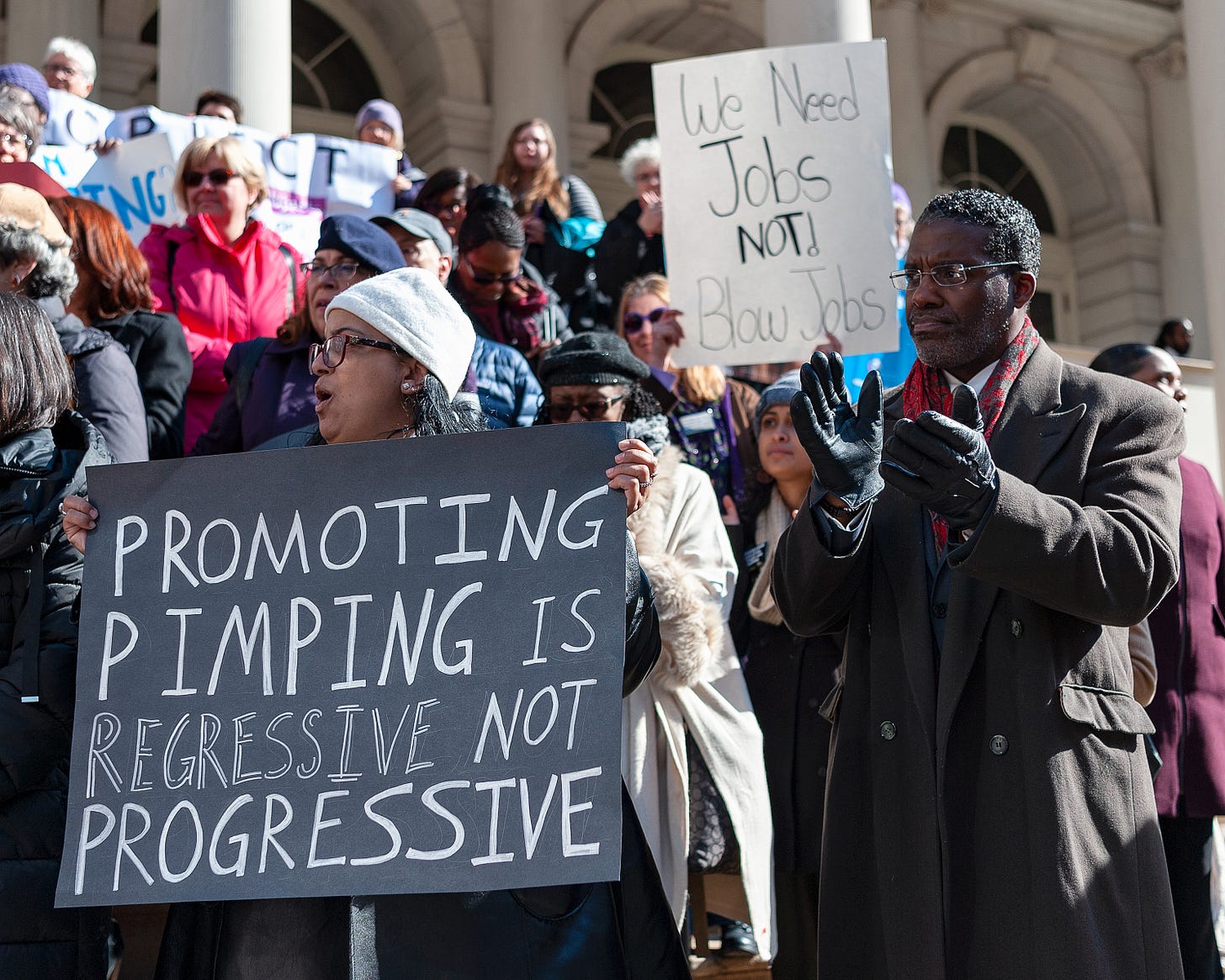
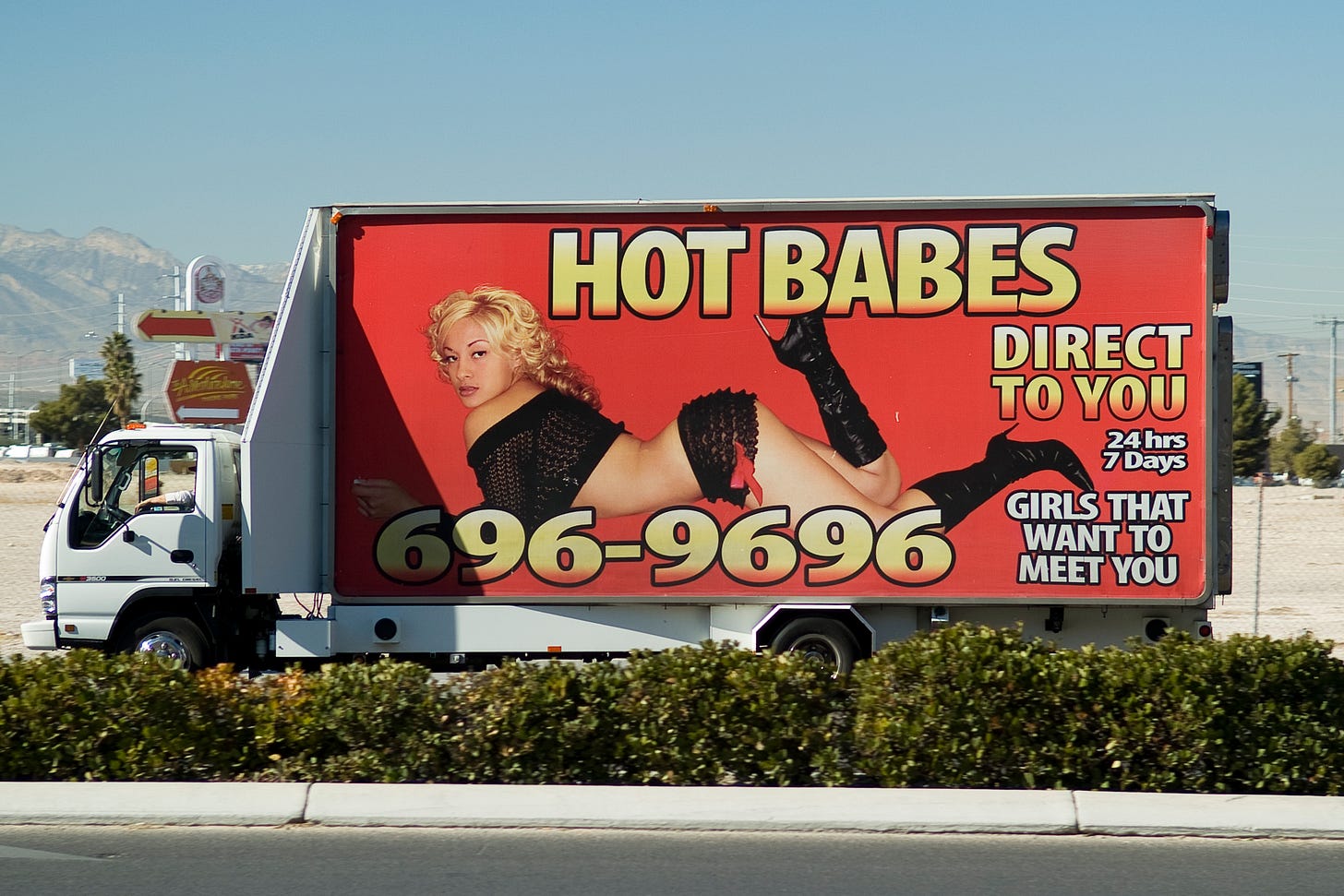
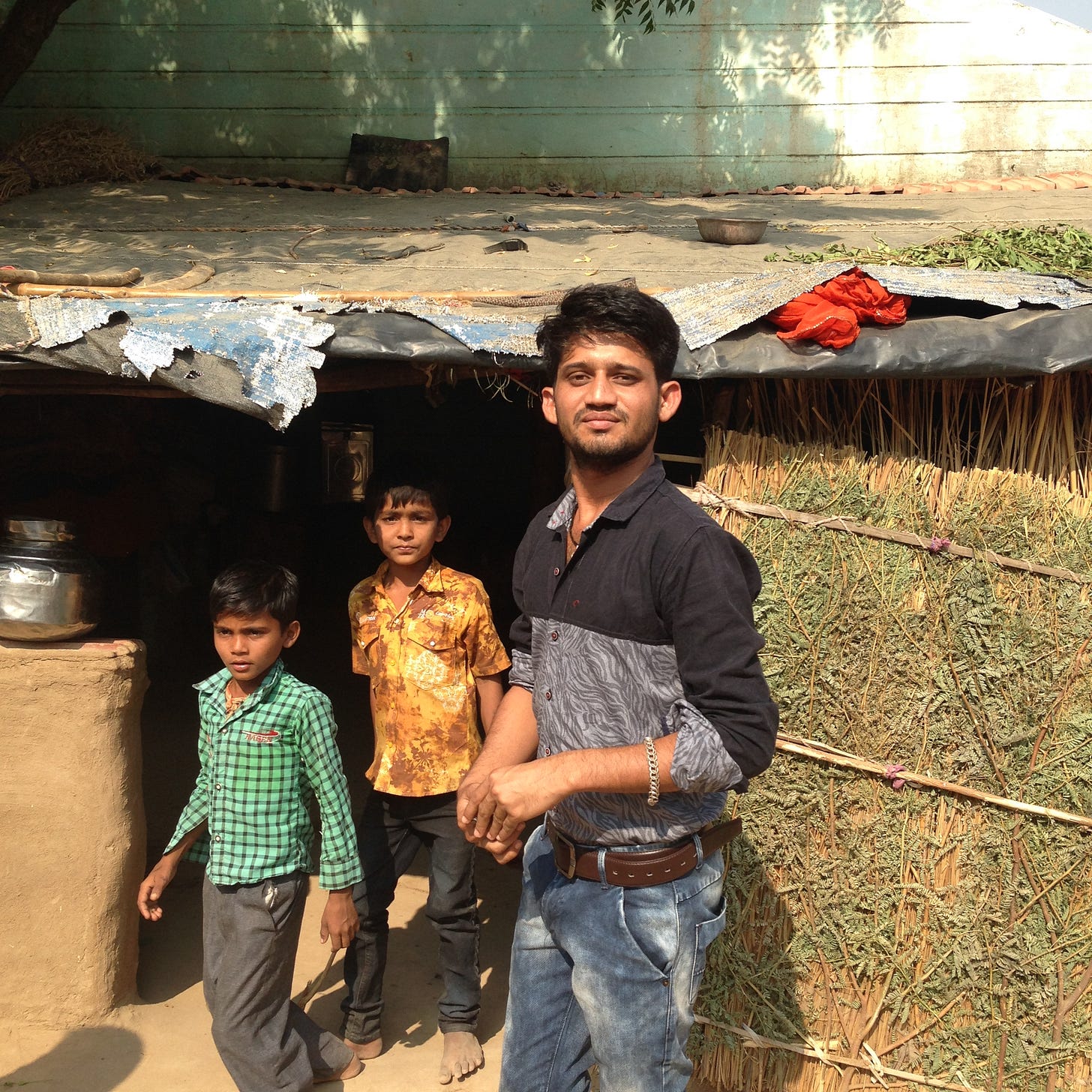
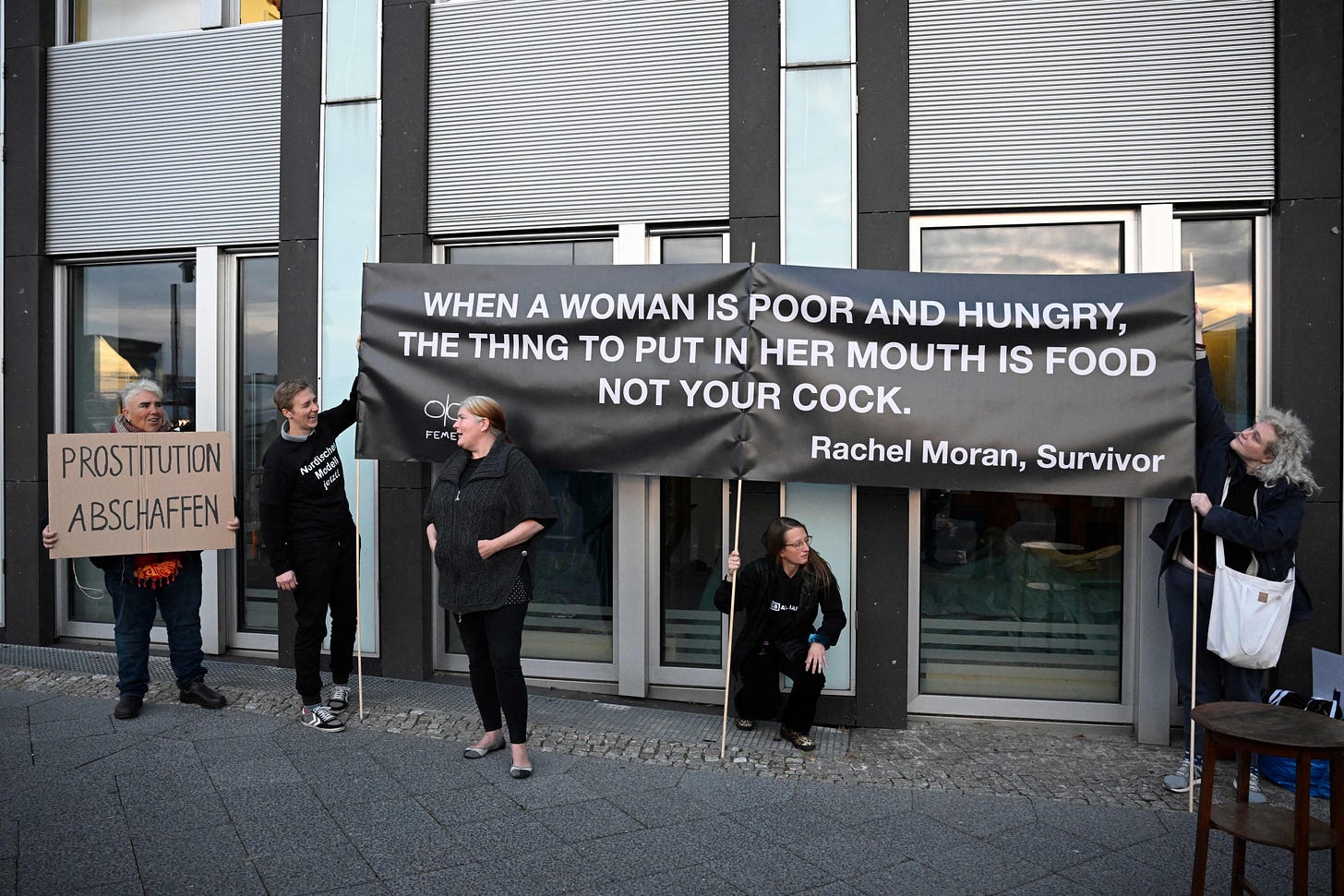
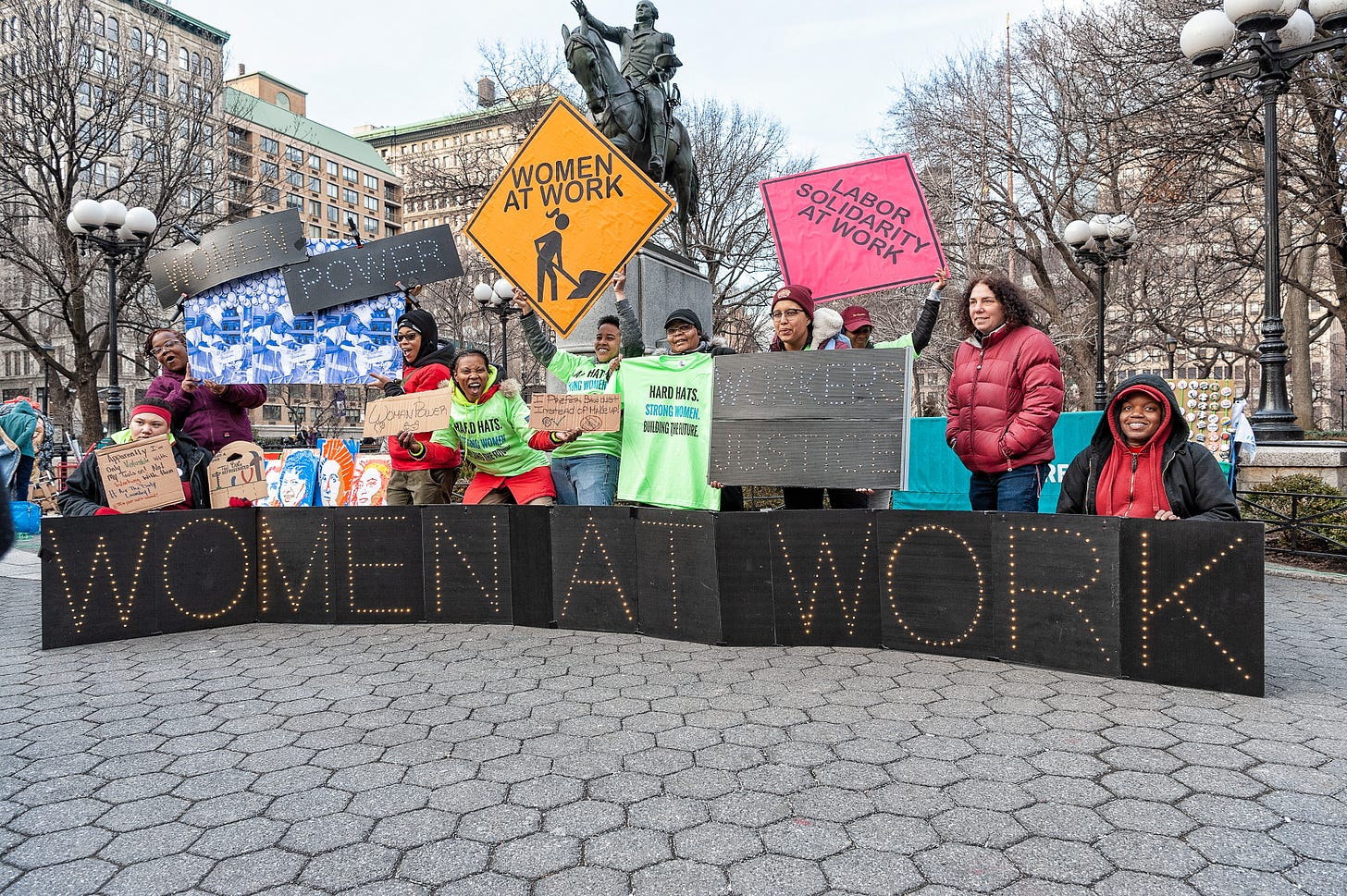

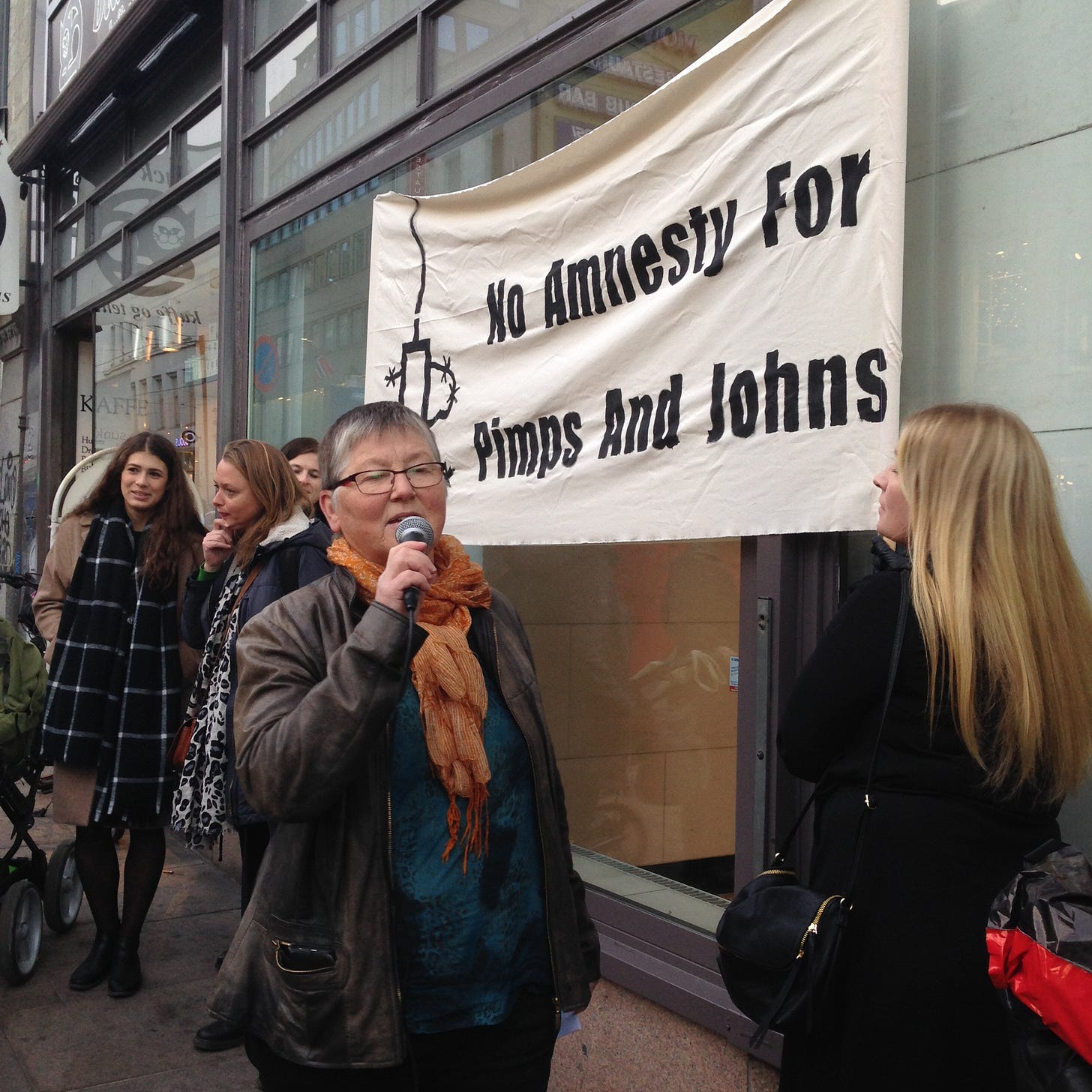

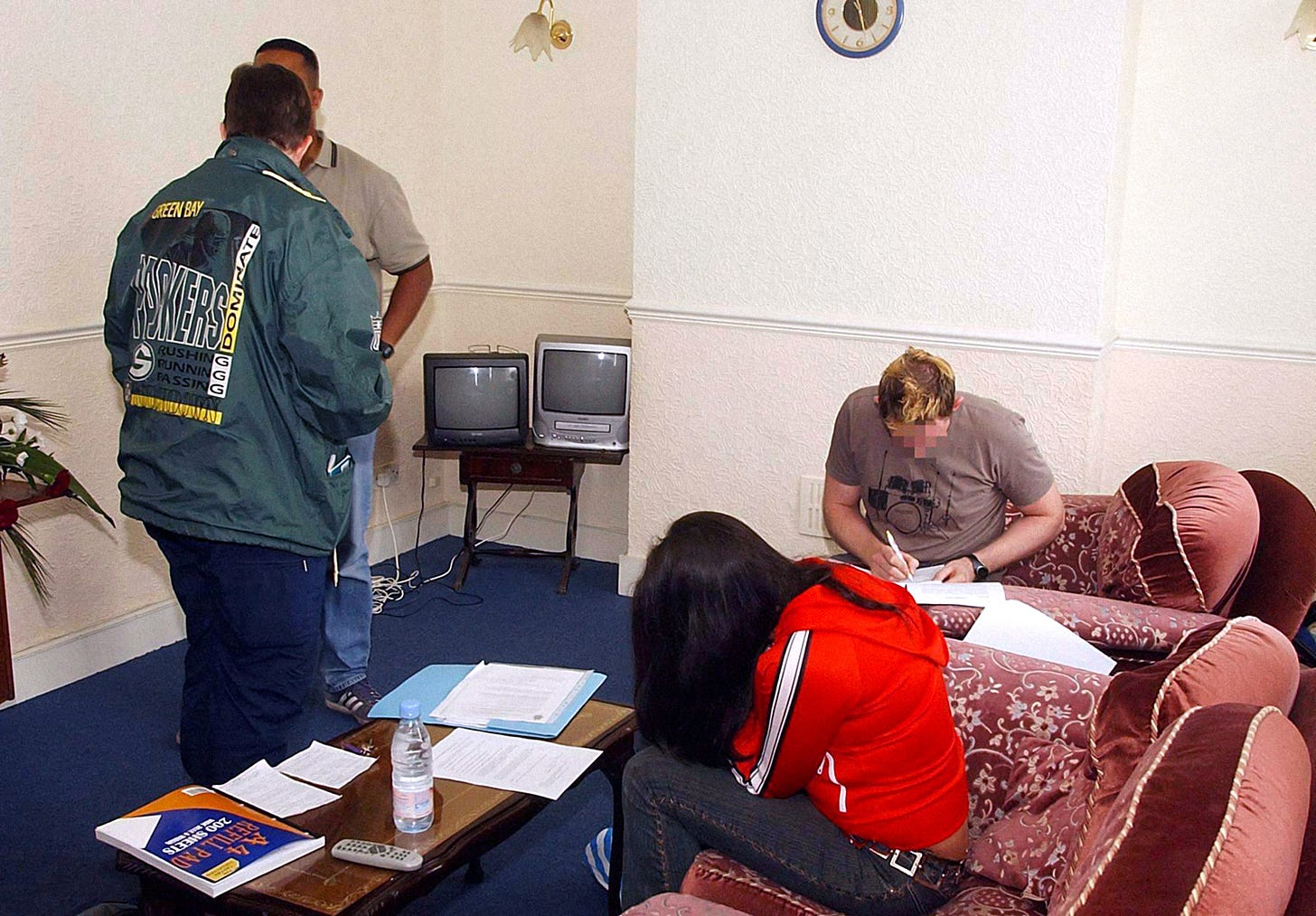
Well done Julie. Your indomitable and constant presence is a thorn in the side of all those who rejoice at the exploitation of women’s bodies. I hope this convinces others that the sexual abuse of women for the pleasure of men is a human rights abuse, however you dress it up.
Well said. When I worked with abused women, I worked with a few who had been/were being prostituted. None wanted the "work" and were coerced into it with violence and threats. Meeting these women showed me just how abusive this odious trade is for women and girls.
In 2017 I went back to university, studying for a MA in criminology. I was horrified to find that when looking at the international differences in legislation around prostitution, I was the only student out of a group of around 30 students, that spoke against prostitution (I got my worst mark for that assignment)!